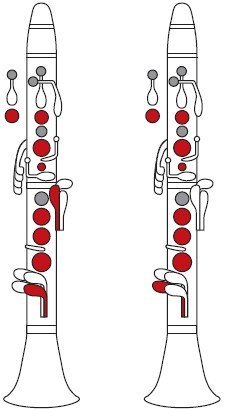The D Minor Scale, known for its deep emotional resonance, has made quite a mark in the history of clarinet music. Have you ever listened to a haunting melody that conjures feelings of sadness and longing? Chances are, you were experiencing the effects of the D Minor Scale. It's like magic! This scale has inspired countless composers and musicians throughout the centuries.

Clarinet Fingering Charts are always FREE at MartinFreres.net!
The D Minor Scale: A Composition of Emotions
Let's explore what makes up the D Minor Scale. It follows a specific sequence of notes: D, E, F, G, A, B?, and C. This arrangement can stir up a wide range of feelings—from melancholy to thoughtful—making it a favorite among composers who want to forge a deep connection with their listeners. You might say it's the perfect tool for those aiming to tug at heartstrings!
Why D Minor Matters in Clarinet Music
You might wonder why this scale stands out in clarinet music. Well, think about the musical giants! Many classical composers, including Mozart and Brahms, have woven this scale into some of their most unforgettable pieces. Take Mozart's Clarinet Concerto in A Major, for example. It features moments where the D Minor Scale makes a surprise appearance, adding depth and feeling to the composition.
| Composer | Notable Work | D Minor Scale Usage |
|---|---|---|
| Mozart | Clarinet Concerto in A Major | Subtle integration for emotional depth |
| Brahms | Clarinet Quintet in B minor | Used for dramatic transitions |
| Debussy | Clarinet Rhapsody | Fluid navigation through D Minor |
D Minor: Bridging Musical Styles
As we look through music history, we see that the D Minor Scale's influence goes far beyond classical music. Jazz artists also embrace this scale, weaving it into their improvisations. Can you picture the countless amazing jam sessions that have sprung from its soulful notes? It's like a musical bridge, connecting various styles and genres.
The Martin Freres Experience
Playing the D Minor Scale on a Martin Freres clarinet is truly special. The quality of these instruments brings out the full potential of this scale. For clarinetists, practicing the D Minor Scale can boost your technical abilities, fine-tune your pitch, and ultimately let you express a wide spectrum of emotions in your performances.
Emotional Journeys in D Minor
Have you ever caught the emotional shifts in pieces written in this scale? It's as if the music takes listeners on a heartfelt journey. Consider pieces like Debussy's Clarinet Rhapsody, which flows through D Minor and evokes otherworldly feelings. The interplay between the scale, the clarinet, and the unfolding narrative is simply awe-inspiring!
The “Sorrowful Scale”: A Fun Fact
Here's an interesting tidbit: the D Minor Scale is often called the “sorrowful scale.” When played, its minor quality can reflect human emotions in ways that major scales simply can't match. It's the scale that allows you to pour your heart out through your instrument, creating a powerful experience for both the musician and the audience. If you're looking to form a personal connection through your music, the D Minor Scale is your trusty companion.
D Minor in Clarinet Education
When teaching clarinet, bringing the D Minor Scale into lessons can give students a fresh perspective on music that speaks to them on a personal level. Help them discover their musical voice through this scale. Try improvisation, pre-made exercises, or even encourage them to compose pieces centered around this scale. It can be an incredibly rewarding experience as they explore the emotional richness of D Minor.
A Scale for All Genres
It's worth noting how adaptable the D Minor Scale is across different music genres. Whether you're into jazzy rhythms, classical concertos, or heartfelt ballads, this scale fits right in. It's like a Swiss Army knife for musicians eager to express themselves.
Embracing the Legacy of D Minor
To sum it up, the D Minor Scale is much more than a sequence of notes—it's a crucial part of clarinet music's rich heritage. It has stood the test of time and exemplifies everything beautiful about music. The next time you pick up your Martin Freres clarinet, remember the story behind the D Minor Scale and how much it can enrich your playing. Give the scale a try, and let it sweep you away on a musical adventure!
Table of Contents
- The D Minor Scale: A Composition of Emotions
- Why D Minor Matters in Clarinet Music
- D Minor: Bridging Musical Styles
- The Martin Freres Experience
- Emotional Journeys in D Minor
- The “Sorrowful Scale”: A Fun Fact
- D Minor in Clarinet Education
- A Scale for All Genres
- Embracing the Legacy of D Minor








